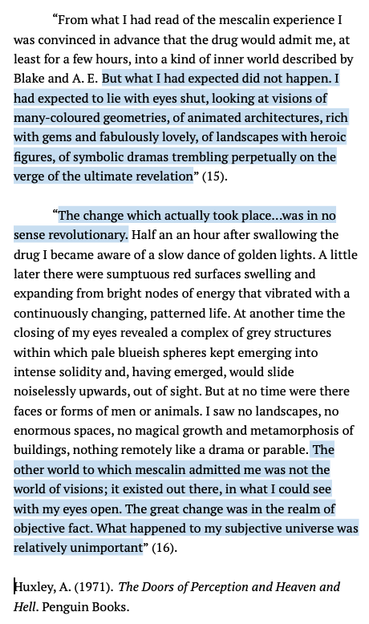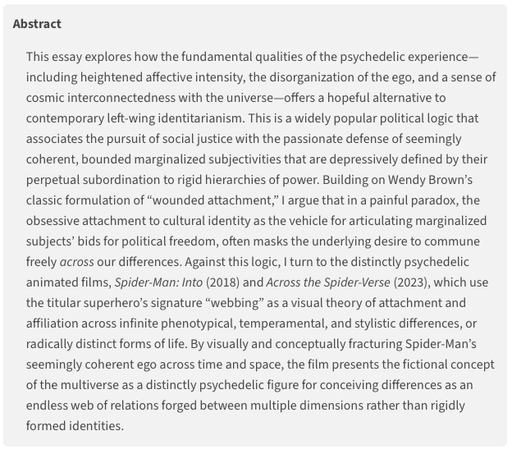Compare this with these excerpts from Huxley's Doors of Perception:
Researcher who explores and writes about #psychedelics and #consciousness, #art, #philosophy, and #modernity from the standpoint of #sociology and #anthropology. MA in anthropology. He/him, please. 🏳️🌈
What are #psychedelic experiences like? I think about this a lot. I've never seen anything like this fragment of a memory from a #DMT experience, yet this simulation does a really excellent job, imo, of capturing a certain sense of the experience. Why is that?
Stan Grof (starting at about 18:13): "I realized people were not having #LSD experiences; they were having experiences of themselves, but they were coming from depths that, you know, psychoanalysts didn’t know anything about.”
No need to listen to the whole podcast unless you really want to, but this is such a great insight.
So, the #DoctorWho season premier was much better than I anticipated. Honestly after "Space Babies," I'd almost given up all hope for this show, and that's something for someone with three Doctor Who tattoos.
"What is it about #psychedelic visuals that makes them so arresting and absorbing? In Heaven and Hell, Aldous Huxley argued that the arresting qualities of psychedelic visuals derives from their relation to mythic and preternatural realms of the mind."
https://psychedelicpress.co.uk/blogs/psychedelic-press-blog/science-psychedelic-aesthetics
BTW, the catalog for the Vogel Collection's "Fifty Works for Fifty States" is available for free on arts.gov (for now, at least):
Here they are on "60 Minutes" in 1995 if you don't have a time for the Herb and Dorothy documentary.
If I ever find a 9–5 job again, I'm going to start collecting art like Herb and Dorothy Vogel. I mean, I don't want to make my home into an art warehouse, exactly, but consciously buying artworks that I enjoy and speak to me on some level. What an inspiration!
Spider-Man, psychedelics, and the multiverse—really cool OA essay. Abstract in the comments.
3/ “As Jason Ānanda, one of the major exponents of metamodernism, puts it, ‘much of the postmodern canon was even rooted in its own pessimistic grand narratives about the fallenness of Being, colonialism, the death of God, or disenchantment.’”
2/ “Proponents of metamodernism further claim that although postmodernists announced the death of grand narratives, this has in fact not prevented new grand narratives from emerging, such as the new narratives of pluralism, global democratization, and secularism.”
Something else I've been thinking about lately: modernism vs. postmodernism vs. metamodernism.
“While postmodernism denounced metanarratives, metamodernism acknowledges that metanarratives are still current, and that the concept of the grand narrative should not be rejected in its entirety." 🧵 1/3
https://philosophynow.org/issues/162/From_Postmodernism_to_Metamodernism
3/ If one is successful, then that's an indication of God's favor. If not, then you're basically doomed. DOOOOMED!
Anyway, here's the Wikipedia page, too:
https://en.wikipedia.org/wiki/The_Protestant_Ethic_and_the_Spirit_of_Capitalism
2/ While not above criticism, the tl;dr of Weber's argument is that Protestants, and especially Calvinists, believe that God has already decided who is saved, and that through "hard work" and worldly success, one can determine if one is among those destined for salvation.
One of the books I read (or at least skimmed 🤷🏻♂️) in grad school that's stuck with me is Max Weber's "The Protestant Ethic and the Spirit of Capitalism," first published in German in 1905, and translated into English in 1930. 🧵 1/3
https://archive.org/details/pdfy-8fnkKz0SleumNaIz/page/n27/mode/2up
This is such an interesting question. I started to write a whole perspective, then deleted it, because there are so many ways to look at it and think about it—all or none of them may be "correct."
@hyperallergic.com #art #philosophy #aesthetics
Facts and data actually help.
"A key finding is that 52% of all autocratization episodes become U-Turns, which increases to 73% when focusing on the last 30 years. The vast majority of U-Turns (90%) lead to restored or even improved levels of democracy."
This is not a political account, and I really don't want to talk about politics—but, I can't keep doomscrolling. Is there any good news right now? I feel shellshocked.

